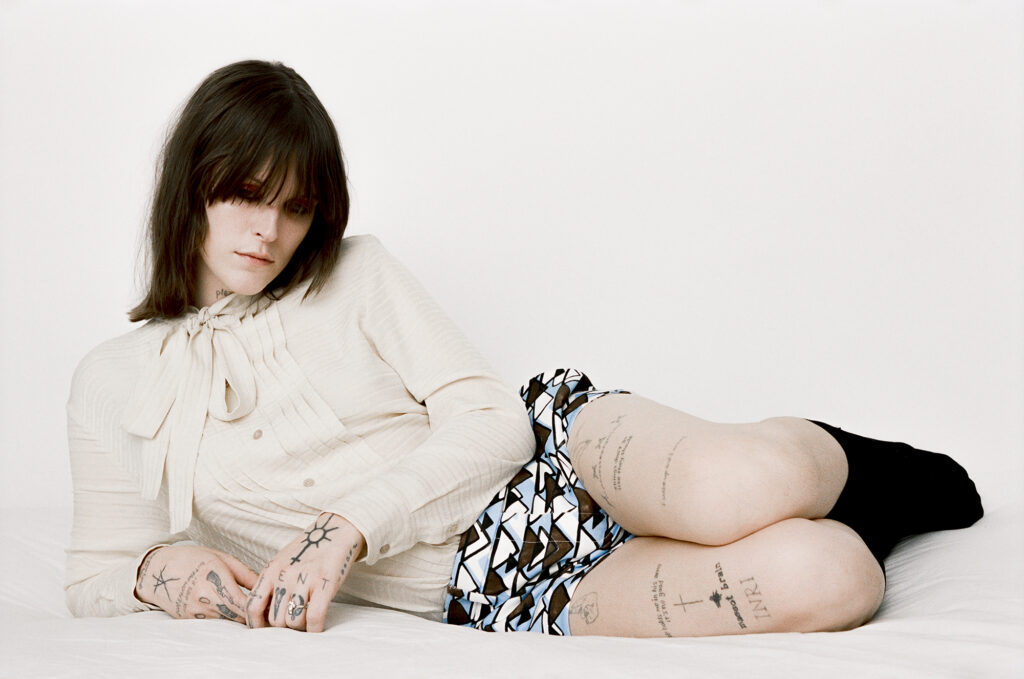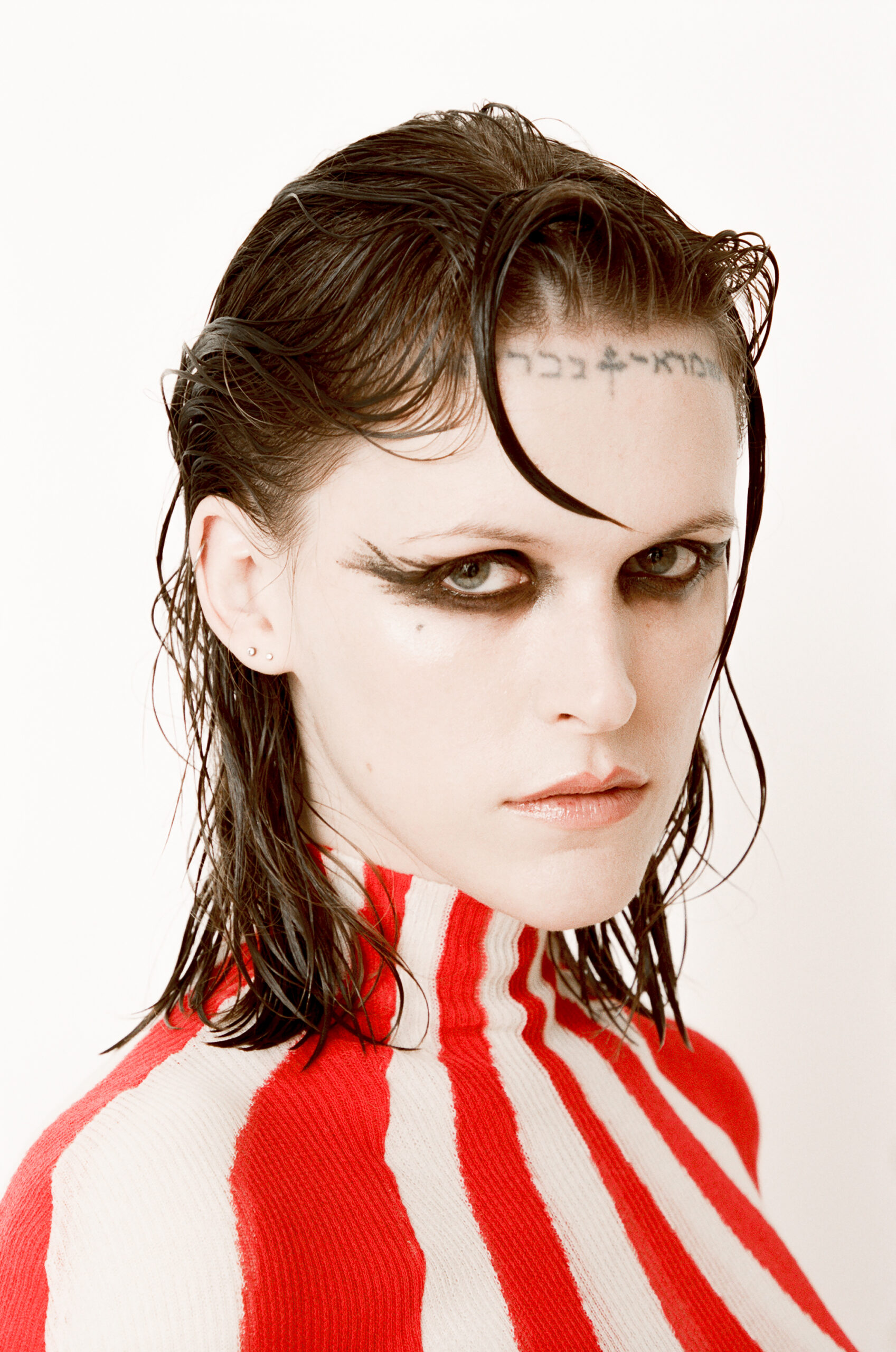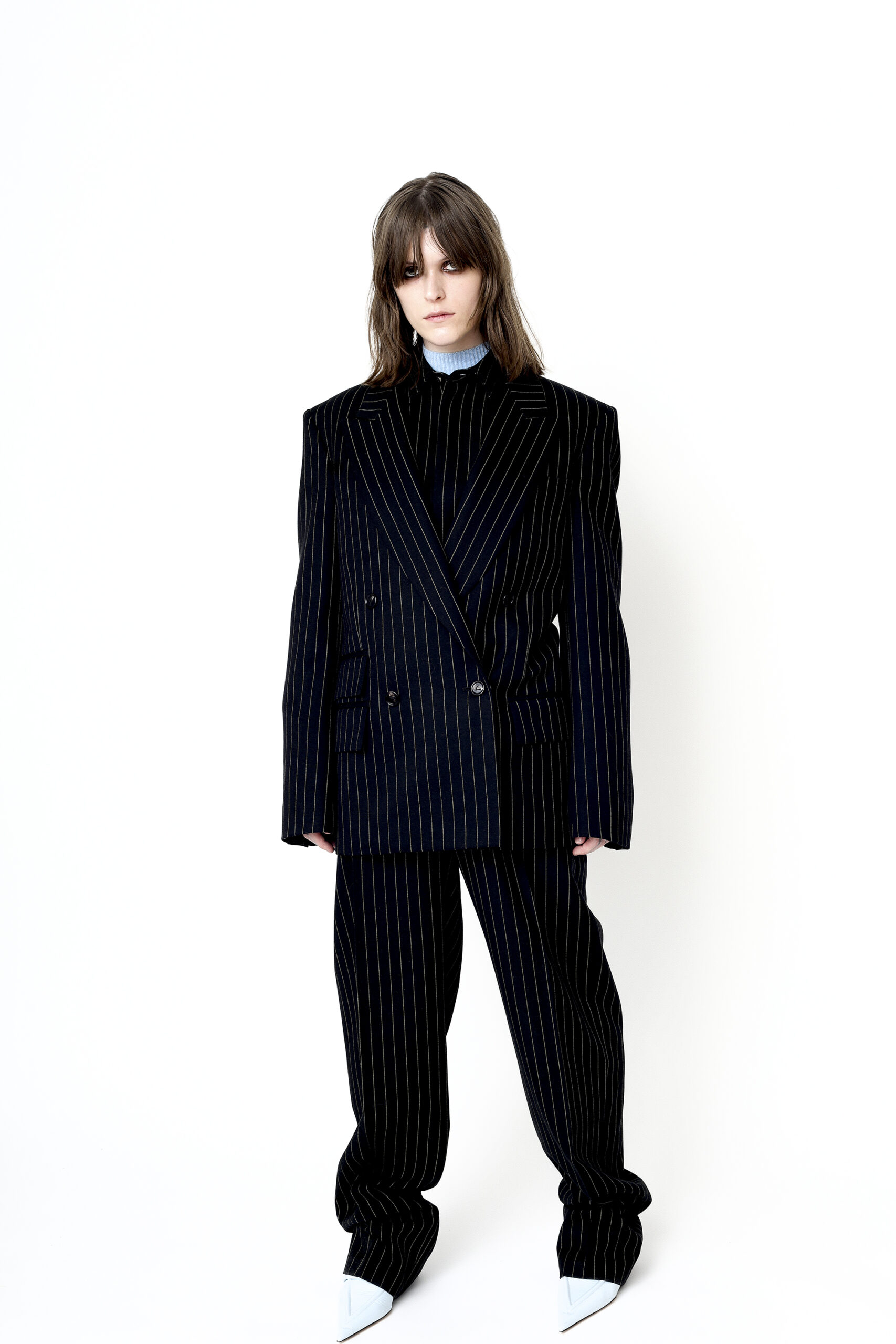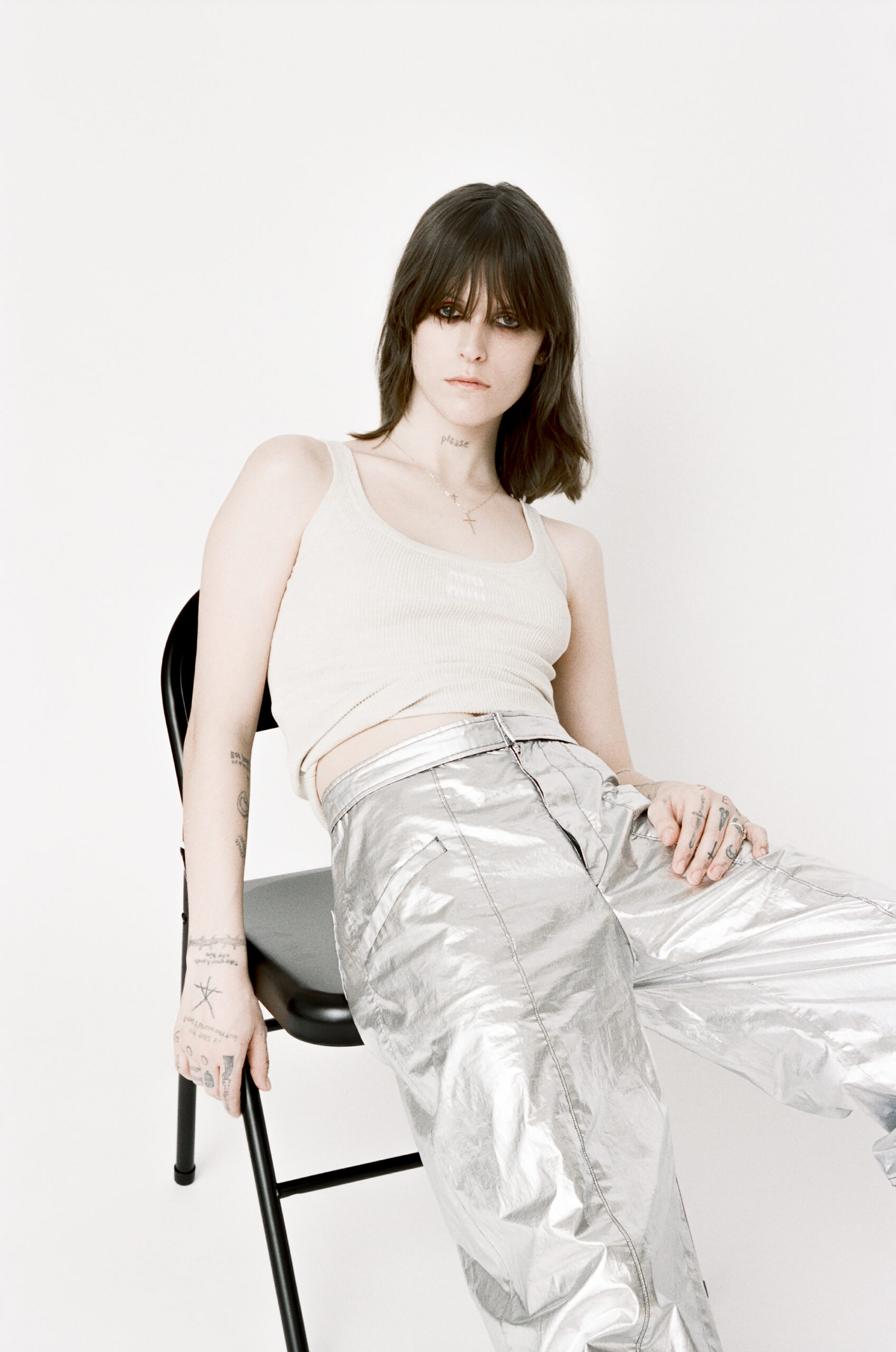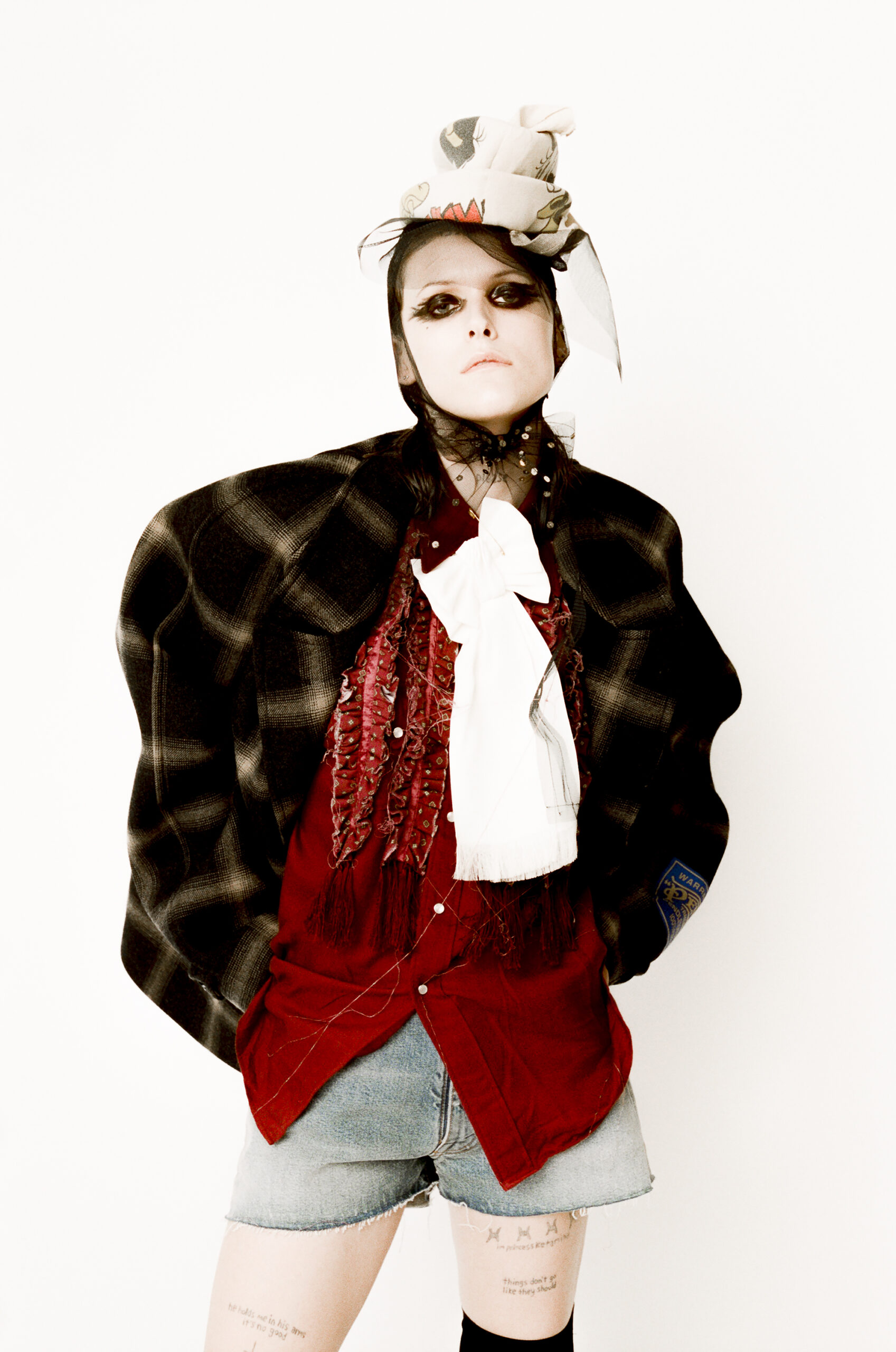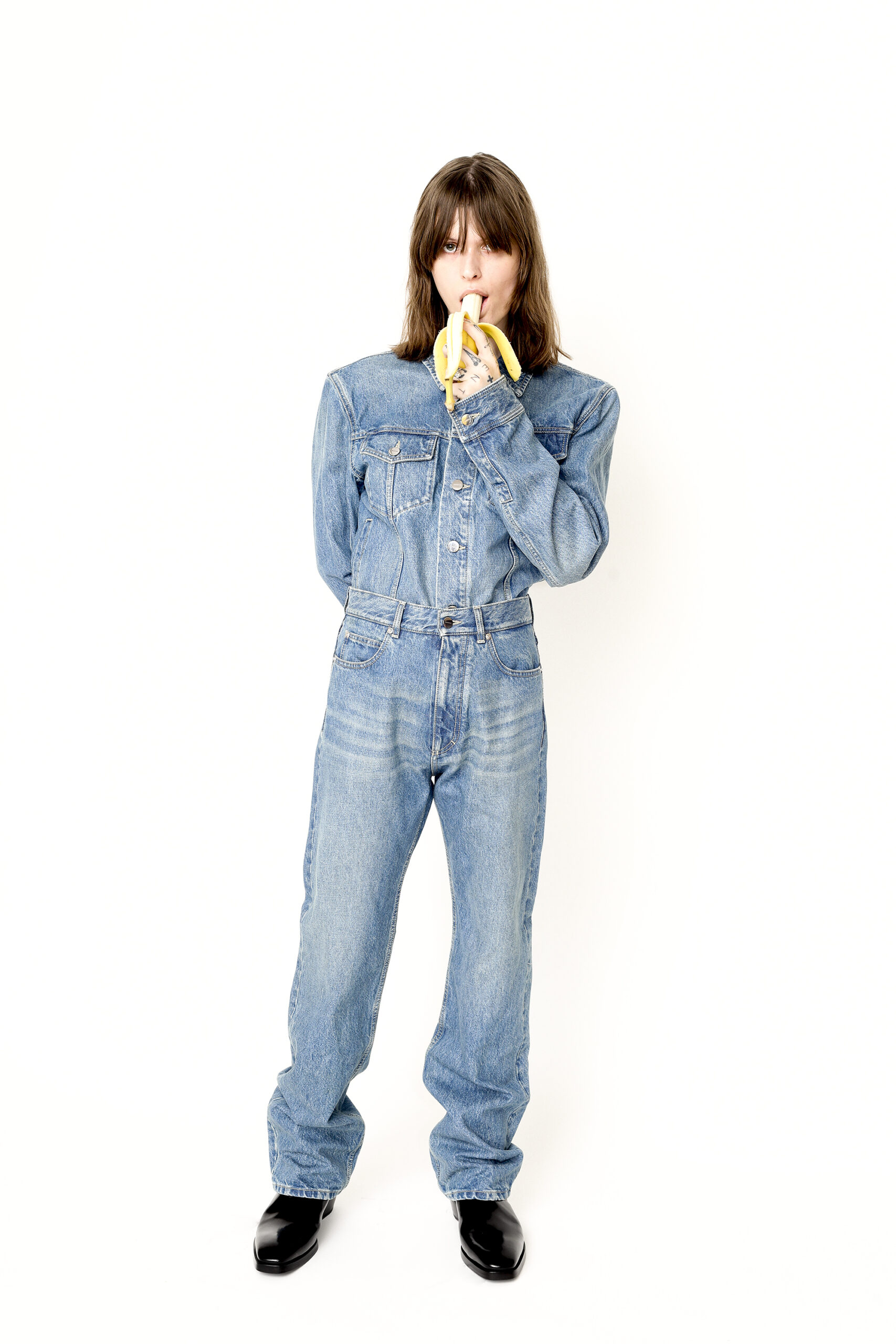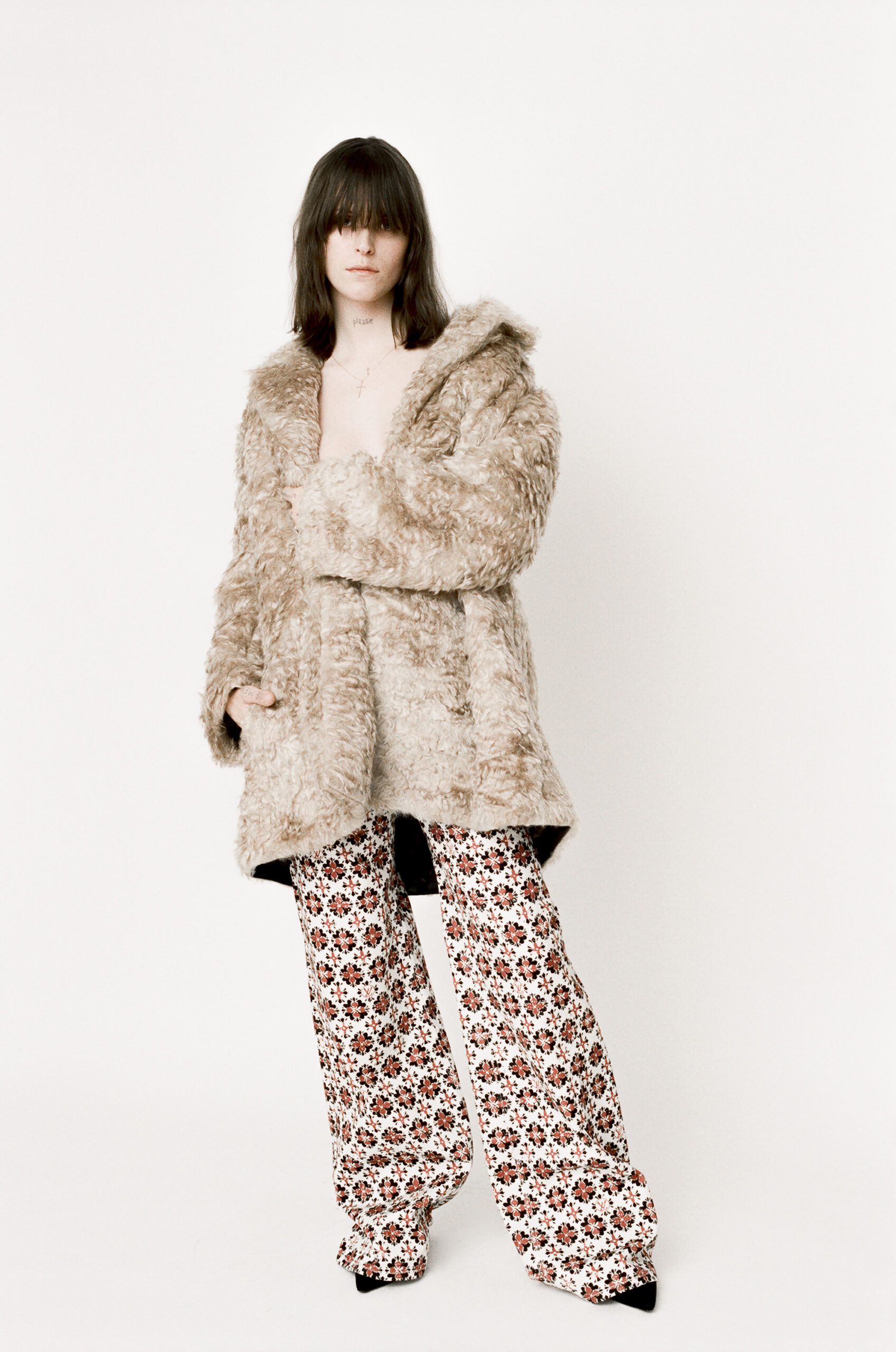Ethel Cain is still coming down from her first-ever Coachella performance when she gets on a call with her one fan to have played Sabrina the Teenage Witch, the actor Kiernan Shipka. Like the rest of Ethel’s fans, Kiernan was captivated by the Tallahassee-born singer’s slow-burn, Southern Gothic–inflected debut album, Preacher’s Daughter, so she messaged her on Instagram to let her know. Today, however, Kiernan has more than just praise. She has questions, and lots of them.
———
MONDAY 11 AM APR. 17, 2023 LA
ETHEL CAIN: Hi! How are you?
KIERNAN SHIPKA: I’m good! How was Coachella?
CAIN: It was a blast. It went by so fast. We got there at 8:45 in the morning and were there until 11 p.m. and it somehow felt like 30 minutes.
SHIPKA: How did it go?
CAIN: The show was fun. I didn’t catch anybody else yet, but my friends are coming into town tomorrow, so we’re going to actually do Coachella this weekend now that the first weekend is over and I know how it works.
SHIPKA: That’s fun. I’m so sorry you missed Yung Lean though. It’s a tragedy.
CAIN: I’m going to do some finessing and figure out how to see him for at least five minutes this weekend.
SHIPKA: You should. My 2014 youth in its entirety was Yung Lean.
CAIN: My sister and I are obsessed with him.
SHIPKA: I had a crush on someone who introduced me to Yung Lean and it was over. So shall we dive in? I have questions and whatnot.
CAIN: Yeah, for sure.
SHIPKA: I’m so excited to talk to you because I’m such a big fan.
CAIN: Oh, same!
SHIPKA: Thank you! I’m also happy we connected because I remember I posted a very stupid video of Kermit the Frog dancing to “American Teenager” and I greatly debated whether or not it was going to be close friends or if I was going to tag you and it be a public situation that I put myself in. But now here we are, so it’s all good.
CAIN: I’m so glad you did. It made my whole day.
SHIPKA: Oh, that’s good. I felt like it could have gone south, so I’m happy that it landed. I’m curious—because I know that song was kind of a bit, or you did it as what you call a “fake pop song”—are you interested in making more music like that?
CAIN: I am. I actually made “American Teenager” because I enjoyed it. I kind of fibbed and said it was a bit. I love pop music, but my biggest problem is that a lot of times when you make music like that, you attract a whole bunch of people who only want that from you. And then there’s also this weird stigma around pop artists where a lot of them are taken less seriously for whatever reason. I was really scared that if I made pop music, I wouldn’t be taken seriously for the non-pop songs. But I’m getting to the point where I don’t care. I love pop music in the same way that I love all the other genres that inspire me, so I’m sure it’s going to pop back up in my discography.
SHIPKA: That’s a win for all of us. You have such an avid fandom and there’s so much Ethel Cain lore. How has making new music been post–Preacher’s Daughter and its intense reception? Has it changed?
CAIN: It’s been really fun. When that first big project of yours comes out, it’s like, “Okay, this is my debut to the world. Are people going to receive it well?” I was stressed about making something that I felt had artistic integrity, but that would also be palatable to people. All of my original demos for the album were basically the slowed and reverbed versions of the songs that you hear on the final record. I would show them to my friends and nine out of ten would be like, “I would not listen to this.” And I was like, “Okay. Noted.” So I changed it a bit, and people loved it. But I’m excited to push it farther into the direction that I’ve always wanted to go, which is 10- to 20-minute songs just drenched in reverb, so slow, and super repetitive. I have a huge affinity for slowcore and ambient music, so I’m excited to take a step in that direction. I feel a bit more confident doing that and less worried about what people will think.
SHIPKA: That’s amazing. Are you making the music in Alabama?
CAIN: I actually left Alabama recently. I moved to Pittsburgh.
SHIPKA: No way. How’s that?
CAIN: I’ve been enjoying it. It’s definitely not the South. I’m leaving Pittsburgh in November when my lease is up, but it’s been cool. I wrote most of the songs in Alabama and now I’m finishing them elsewhere, which is always weird because the songs are so tied to where I live. Writing them in one place and capturing the vibe of where I’m living and then moving somewhere else and trying to finish them feels a little disjointed. It’s been difficult working on them in Pittsburgh, and impossible to work on them in L.A. I’m excited to go back down South after I leave Pittsburgh, but the EP should be done by then. But yeah, Alabama is where I wrote the first song for the EP, and my heart will always be in Alabama when I think about this project.
SHIPKA: You capture a time and place like not many artists do, and it’s so visceral. I know that in the past year, you’ve kind of exploded and done traveling and fashion things and had so many new experiences. Does that ever make its way into your work?
CAIN: The only time that I’m able to really ingest my surroundings on a full creative, inspirational level is when I’m at home. I don’t really do that when I’m traveling for work because I’m focused on the itinerary for the day. There’s not a lot of room to be inspired by the little things. I chose Pittsburgh because it’s so different from the South. Instead of being flat and hot and green it’s very hilly and gray and cold. A huge inspiration for my song “Ptolemaea” on Preacher’s Daughter was a movie that had you in it, The Blackcoat’s Daughter, which is one of my favorite horror movies.
SHIPKA: No way. Oh my gosh. I wish more people saw that.
CAIN: It’s so underrated.
SHIPKA: Thank you.
CAIN: I remember thinking that it was so slow and drawn out and cold, and I really loved that feeling because it was something I’d never felt before living in Florida. So yeah, that was one of the things that really drew me to that cold, bitter environment. It’s nice to have a change of pace.
SHIPKA: I want to pivot and ask a little bit about Hayden [Anhedönia, her government name] and Ethel. Where does Hayden end and Ethel begin?
CAIN: It’s splitting a bit further now. That’s why I cut my hair. I was like, “I need to step away from this a little bit.” When I first started the project, I was very much sitting in the lap of this character I’d created, and it was the old dresses and the old places. To finish Preacher’s Daughter, I literally moved to Alabama and bought this old iron-frame hospital bed and slept in it for a year with a shitty mattress in this old house in the middle of nowhere with no neighbors. I forced myself to live this very pastoral, almost punishing lifestyle. I was like, “I have to do it to embody the character correctly. I really have to get into this headspace.” It almost felt like method acting, but for music.
SHIPKA: Yeah, you’re more intense than most actors I know! I’m inspired.
CAIN: It’s easy to jump deep into that; it’s harder to crawl your way back out. It took me a minute to realize, “You don’t have to be Ethel all the time.” I cut my hair on a manic whim while I was visiting friends in Florida because I was like, “I need to be Hayden.” And now that that record’s done, we’re moving on to other characters. I can’t play everybody convincingly, so I’ve pulled back and now. I keep saying it’s my Beatrix Potter moment. At the end of all the little Beatrix Potter cartoons I watched as a kid, you see her writing the stories on paper in her house and then it goes into the story. I love that vibe of being the author, like I’m just the portrait on the back of the book and then the character’s inside of it. I’m excited to just be Hayden, be the storyteller, and not have to play these characters and feel like I have to live out these insane stories myself. Because after a while it gets a little tiring.
SHIPKA: It can take a major emotional toll. That’s no joke. So when you perform now, is there a process of assuming Ethel, or do you now feel like Hayden out there?
CAIN: Live performances have always been my least favorite part of this thing, but I enjoy it now more than I did. When I was on tour, I was miserable. I had no idea what I was doing, and I was so stressed all the time. Live performance has never really been part of my artistic process—it’s always been something where I create in a room and put it out. I’ve never had to leave the room and go be out there with the art itself. I kind of toe the line between, “Do I want to be comfortable today and wear my outfits—jeans and a t-shirt—or do I want to wear an old dress with the waist cinched and worry about, ‘Can I breathe in this while I’m trying to sing?’” It’s nowhere near as strict as the rules I make for the art itself. I’m just up there singing with everybody else. It’s a very confusing place to be. If you catch me in an old-lady dress onstage, you could say that’s Ethel. Otherwise it might just be me in a baseball hat.
SHIPKA: I love it. There’s such an expansiveness to the world you’ve created. It’s like there are endless possibilities. I know you’ve talked about books and movies and albums about this world. At this point, do you see a full picture? Do you see a finale? Or are you playing it one album at a time?
CAIN: Oh no, I have the whole picture.
SHIPKA: I love to hear it.
CAIN: I have to work on everything at the same time, because when you’re making something that spans three generations, and it’s all intertwined—the things that are happening at the end, the seeds of those things are going to start happening at the beginning. You have to have a full timeline at the very beginning for continuity’s sake. You need to make sure that things are cohesive and flowing correctly. I really don’t like plot holes, so I’m constantly working to make sure it all fits. And obviously, everything takes time. It was easier to make an album. It’s going to take me a while with the book. Film, as I’m sure you know, is sometimes a decade or longer.
SHIPKA: It’s truly a long journey.
CAIN: I’m probably going to be well into my 40s before this thing is completely done. But good art takes a very long time.
SHIPKA: I’m truly so excited. Is the plan for the next EP to come out later this year?
CAIN: Yeah, I’m trying to get it wrapped up so I can have it out by the end of the year and then move on to other things. Because it’s not Preacher’s Daughter, it’s the B-sides, but it’s still in the realm of Preacher’s Daughter, so I’m excited to put this whole thing to bed and move on to the next piece.
SHIPKA: Are you going to stay in the sort of Southern Gothic biblical world for the larger vision? You do such an incredible job of feeling so steeped in that world, and I wonder how you see that changing over the next couple pieces of work that you put out.
CAIN: Southern Gothic will always be my biggest love. It’s how I grew up. It’s everything I know. That will always be the through-line between or beneath all these projects. But I am excited to get into some other elements. I’m finding new ways to tie in all of these interests that I have. I love to push my own envelope and see what I can get away with attaching to the central theme of this story, this trilogy. There are a lot of other things that inspire me. I’m a huge horror fan. I love sci-fi. I love that spooky nihilism of both the past and the future. All I can say is it’s going to get scarier from here on out.
SHIPKA: Hell yeah. It really feels like you’ve created this career where there are no rules and no limits. Do you feel fearless?
CAIN: The only thing I fear is not fully executing a project the way that I want it. We’ve reached a point in art where the more corporate side of things has taken over, and it dictates how much creativity an artist has based on how much it’s going to sell. I don’t come from a lot of money and I don’t really plan on going towards a lot of money unless it’s for the art itself, so how well a project’s going to do doesn’t register in my brain. A lot of my favorite art was made by people who didn’t get super famous or make a billion dollars, but they made something that they were proud of. That’s the only mindset I want to cling to going forward. I’ve told my whole team, “The only goal I have for this career is making something that I can look back on and be like, ‘I made a good body of work.’” That success is super obtainable if that’s all you consider success to be. It makes it less scary when that’s all you’re really counting on, because it’s just between you and yourself.
SHIPKA: You’re right. If you’re doing it for yourself, it makes everything a little bit more weightless. You’ve got such a beautiful perspective on that. I have a weird question for you: I was wondering if you think about dreams, or if there’s anything that you pull from them. I feel like you have incredible dreams, so I had to ask.
CAIN: I have crazy vivid dreams, dreams that are so stressful you can wake up after sleeping for 12 hours and still be exhausted because it’s so intense. And I don’t know why, but in a lot of my dreams there are always people trying to kill me, or I killed somebody and I’m trying to not get in trouble. There’s always this chase, someone’s after me. I’m constantly stressed, trying to get away from something. But whether they’re nightmares or good dreams, they’re always doing way too much. I have a dream journal where I write down the really weird bits, and sometimes they do find their way into my art. I actually wrote an entire four-book series when I was in middle school and high school, based off a dream that I had. So yeah, listening to your dreams and being in tune with them is really important because it’ll tell you things about yourself that you probably wouldn’t know otherwise, or you’d have to do a ton of acid to figure out.
SHIPKA: I agree. I had a dream the other day that I could not make sense of, so I asked someone that I knew could, and they told me. It was completely on the money, and I learned so much from it.
CAIN: Yeah, the answers are usually right there, if you can just figure out how to pull them out.
———
Hair: Lauren Palmer-Smith using Oribe at Forward Artists
Makeup: Holly Silius using Byredo at R3-MGMT
Nails: Emi Kudo at A-Frame Agency
Set Design: Niamh Hannigan
Photography Assistant: Brandon Noriega
Fashion Assistant: Isabella Fields

